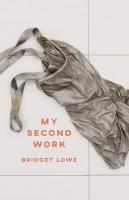
“Poetry is a matter of life, not just of language.” Lucille Clifton
This quote—a favorite, I freely admit—echoed in my mind as I read and re-read Bridget Lowe’s second collection, My Second Work. I understand Clifton’s quote to mean that poetry can be esoteric—a symphony of sounds that lull us into a state in which we choose to not question the meaning of it all simply because it sounds so good in the air. Let’s be clear: I love poetry that sings to me and, sometimes, I do not care “what it means” or if it means anything to me, personally, because the language of it lets me imagine/lets me revel/lets me suspend logic and roll with it in a way I will not do with prose.
I couldn’t shake thoughts of Clifton’s quote as I read because Lowe’s work, somehow, embodies the quote by transforming relatable stories/experiences into poetry through lyricism, mystery, and form.
I recognize snapshots of my own life in Lowe’s poems: a bike ride in spring, a longing to be seen while doing my best to hide, religious ritual, nature as refuge (and witness), familial angst/longing/love, motherhood, birth….and yet I know these poems are not about me. These poems transcend a singular experience and instead bring the reader to a place of contemplation. It asks questions: how does what I experienced in childhood affect me as an adult; how do we grow from trauma, from pain; why does it matter that I see you or that you see me? (these questions aren’t exhaustive and, truthfully, I have no idea if Lowe intended these as questions at all. I’m simply sharing the reactions I had as a read, the questions I noted in margins and thought about even after I closed the book and went back to my everyday routines).
Lowe can tell a story: read “The Understudy,” for example, and you’ll clearly see a person on a bike in the glory of spring. Lowe brings the scene to life: tiny hills with moats/of purple flowers and I let go of the handlebars and beat/my chest with shame’s gorilla fist/until the trees get in my way.
And it’s not just one poem; Lowe’s adept narrative ability is apparent throughout the book: on the bike, at home with siblings while a mother worked, at a first job at a candy store and a second in a laundromat. This narrative grounds me, as a reader, in a place—it gives me footing, something to clutch as Lowe’s narrative voice turn lyrical, takes me unexpected places/prompts unexpected questions and feelings.
The “I feel this” experience of Lowe’s collection is very real for me. And yet; this is a collection of poetry, not a book of prose. Not a memoir. As a genre, I tend to expect more than a “me too” moment (or moments) from poetry; I expect language that blurs the lines and transports me to a place wholly other than my own reality.
Lowe does exactly that. My Second Work spans a Grand Canyon of emotion: grief, pain, guilt, bewilderment—and yes, there is also palpable wonder and joy, and, too, wisdom. I know all of these emotions but I don’t know them, not like you do. Not like Lowe does. That’s the beauty of Lowe’s poetry, I think: it’s both familiar and foreign, safe and a little dangerous, comforting and disconcerting. It’s what I want from a poetry collection.
It’s the interplay of life and language—how the two elements feed off one another, give (and withhold) air—that take Lowe’s collection from the viewpoint of an “I,” (as in, I rode a bike/ I sat under the tree/ I had a baby) to an “eye/witness” (as in I am human and this is how I understand it/I am flawed and this is how it influences me).
Reading My Second Work, I couldn’t help but think about the experience of being human and of sharing that with people I know and don’t know. I know what it is to grow up in Kansas, to be a teenager and steal from the place I worked, to be in awe of creating another life; but I don’t really know what it’s like for Bridget Lowe to grow up in Kansas, to be a teenager and steal from the place she worked, to be her and give birth. The distinctions barely matter, though—because I know, as a reader, that Bridget Lowe the poet has taken our collective everyday experiences and turned them into something else/has transformed them from mine to ours.
Bridget Lowe will join Johnson County Library during National Poetry Month to present three programs. You can learn about them here.
Bridget was kind enough to create a reading list that inspired/informed her in her work/life. Part of that list can be found here. The list, in its entirety, is printed below.
Poetry
Metamorphoses, Ovid (various translations)
Shakespeare’s Sonnets
The Poetry of Petrarch, translated by David Young
Bewilderment: New Poems and Translations, David Ferry
In the Dark, Ruth Stone
Bestiary, Donika Kelly
Letters to a Stranger, Thomas James
Obit, Victoria Chang
Marvels of the Invisible, Jenny Molberg
Refusal, Jenny Molberg
My Second Work, Bridget Lowe
At the Autopsy of Vaslav Nijinsky, Bridget Lowe
Nonfiction
Metamorphosis and Identity, Caroline Walker-Bynum
Rabelais and His World, Mikhail Bakhtin
Fiction
The Metamorphosis and Other Stories (or Collected Stories), Franz Kafka
The Devil and Other Stories, Leo Tolstoy (translated by Louise and Aylmer Maud)
Pastoralia, George Saunders
Madam Bovary, Gustav Flaubert (translated by Lydia Davis)
